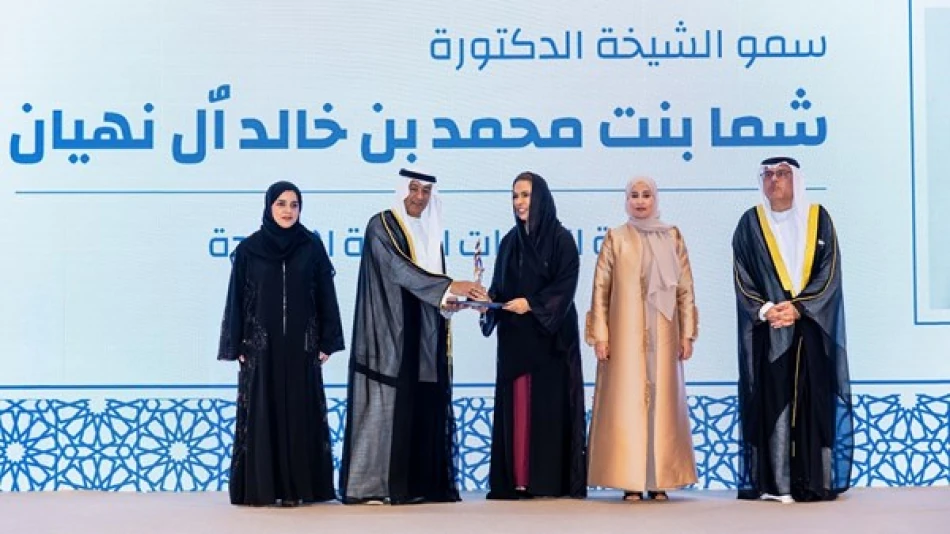
Emirati Trailblazer Shamma bint Mohammed Al Nahyan Honored by Gulf Cooperation Council for Social Impact
UAE Royal Leader Recognized for Transformative Social Impact Across Gulf Region
The Gulf Cooperation Council has honored Dr. Sheikha Shama bint Mohammed bin Khalid Al Nahyan as the UAE's leading figure in civil society work, recognizing her cultural and educational institutions as a regional model for community empowerment. The recognition highlights the UAE's strategic approach to soft power diplomacy through grassroots social development across the Gulf.
High-Profile Recognition at Regional Summit
The formal ceremony took place during the 11th meeting of GCC Social Development Ministers in Kuwait, attended by senior officials including Kuwait's First Deputy Prime Minister Sheikh Fahd Youssef Saud Al-Sabah and GCC Secretary-General Jasim Mohammed Al-Budaiwi. The event underscores the growing importance Gulf states place on civil society organizations as instruments of regional influence and social cohesion.
Dr. Sheikha Shama serves as Chairman of the Board of Directors of Sheikh Mohammed bin Khalid Al Nahyan Cultural and Educational Institutions, which the UAE's Ministry of Community Empowerment nominated for the honor based on her institutional achievements in youth empowerment and cultural preservation.
Strategic Soft Power Through Social Innovation
The recognition reflects a broader Gulf strategy of leveraging cultural and educational initiatives to project regional leadership. Unlike traditional diplomatic channels, these grassroots programs create lasting bonds between communities while reinforcing national identity—a particularly valuable approach as Gulf states diversify their economies and global partnerships.
Institutional Impact Beyond Borders
The Ministry of Community Empowerment described Sheikh Mohammed bin Khalid Al Nahyan's institutions as among the region's most inspiring models, citing their diverse awareness initiatives and extensive beneficiary networks. This recognition pattern mirrors similar honors given to Emirati leaders in recent years, positioning the UAE as a regional hub for social innovation.
The institutions have launched multiple programs targeting cultural preservation, educational advancement, and youth development—areas that align closely with the UAE's Vision 2071 and broader Gulf modernization efforts.
Regional Framework for Social Leadership
The GCC's formal framework for recognizing community leaders represents a systematic approach to encouraging social entrepreneurship across member states. This initiative aims to identify and replicate successful community projects throughout the Gulf, creating a knowledge-sharing network that could accelerate social development across the region.
Such recognition programs serve dual purposes: they incentivize local innovation while showcasing Gulf states' commitment to social progress to international audiences. This approach has proven particularly effective as regional governments seek to demonstrate their societies' dynamism beyond economic indicators.
Implications for Gulf Social Development
Dr. Sheikha Shama emphasized that the recognition reflects the UAE leadership's commitment to supporting community work, viewing it as both an honor and a responsibility to continue developing cultural and social initiatives. This perspective aligns with the UAE's broader strategy of positioning civil society organizations as key drivers of national development.
The timing of this recognition coincides with increased Gulf investment in social infrastructure and community empowerment programs, suggesting these initiatives may receive expanded support and resources in coming years. For regional observers, such honors indicate which social development models Gulf governments consider most effective and worthy of replication.
Most Viewed News

 Layla Al Mansoori
Layla Al Mansoori






